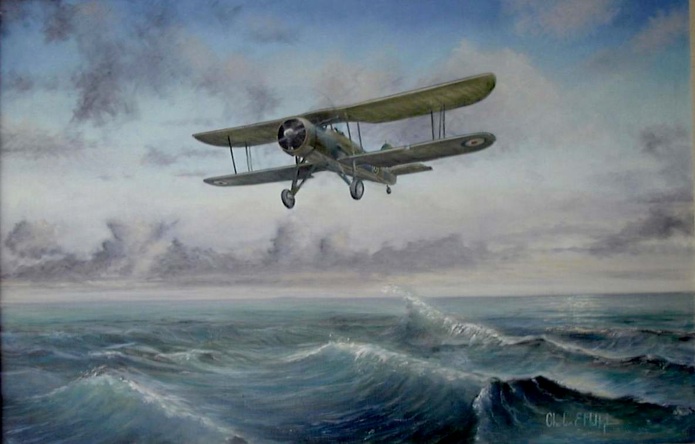11 November 1941 (cont)

[Swordfish by Chas McHugh]
This was the CO's second operational flight from Malta, but it was meant to be Osborn's last. He had come from 829 Squadron on HMS Formidable, where he won a DSC in the Battle of Cape Matapan. Now his six months with 830 were up, and he was due to leave on November 13 to instruct night torpedo dropping at US Naval Station Pensacola, Florida. Taffy Davies, Senior Observer of 830 Squadron, wrote to Dad's father: "The three of us [Osborn, Davies, Campbell] were more or less inseparable during our few short months in Malta."
As he thought through their predicament, Osborn realised "we were in one hell of a situation - lost with 3 relatively inexperienced pilots and crews with the prospect of ditching in heavy seas close to an enemy shore". They had been in the air about three and a half hours, and Osborn thought the island they had seen in the murk might have been Pantellaria not Lampedusa. If so, they were now about 300 miles from Malta without enough fuel to get back.
They altered course for Sicily and looked for a place near land to ditch their planes. The CO couldn't extricate his secret radar set to dump it in the sea, so Osborn ditched their plane some distance from shore to ensure it could not be retrieved. They were lucky to be picked up by a trawler, which took them ashore at Cefalu. Dad and his air gunner Johnie Fallon had their dinghy shot from under them, and faced a long swim in a howling gale. They came ashore exhausted at Cefalu, and were captured the next morning. Sub-Lieutenants RW Taylor and FL Robinson were able to reach land from the third plane that ditched, but the plane with Wigram and Ken Griffiths appeared to hit a rock and explode.
Dad spent time in three Camps in Italy - Montalbo, Padula and Bologna - before being sent to Germany, when Italy changed sides in late 1943. He was taken to Marlag Nord, from where he escaped in early 44. Osborn spent the rest of the war in the same Italian POW camps, and then a German Camp near Luneberg, where he was active on the escape committee. No other FAA POWs escaped from Germany, but four did successfully escape from Italy and North Africa, according to the Fleet Air Arm archive, of whom JR Fallon was one.
Dad received an MBE for his escape, and afterwards he served as a test pilot in the Armament Testing and Development Unit, Gosport, and then as Senior Pilot in 811 Squadron, first Naval Mosquito Squadron, Ford. He left the Navy in 1946 and began a new life in India as a tea planter. But on retiring from Tea in 1974, age 54, his love of flying brought him a late career in management with British Caledonian Airways and British Airways.
The loss of four aircraft and nine men, including the squadron's CO, was a severe blow to 830. They began to join forces with Albacores of 828 Squadron, and, in April 1942, the two depleted squadrons united in The Royal Naval Air Squadron. The last torpedo Swordfish of the old 830 Squadron flew on till November 42. El Alamein had just been won, and on the 10th, supply ships entered Grand Harbour to relieve the siege of Malta. Five miles away, returning from a mission, the noisy roar of a Pegasus engine suddenly stilled, and the plane sank into the sea - its job done.
Links: Next Page Chas McHugh
